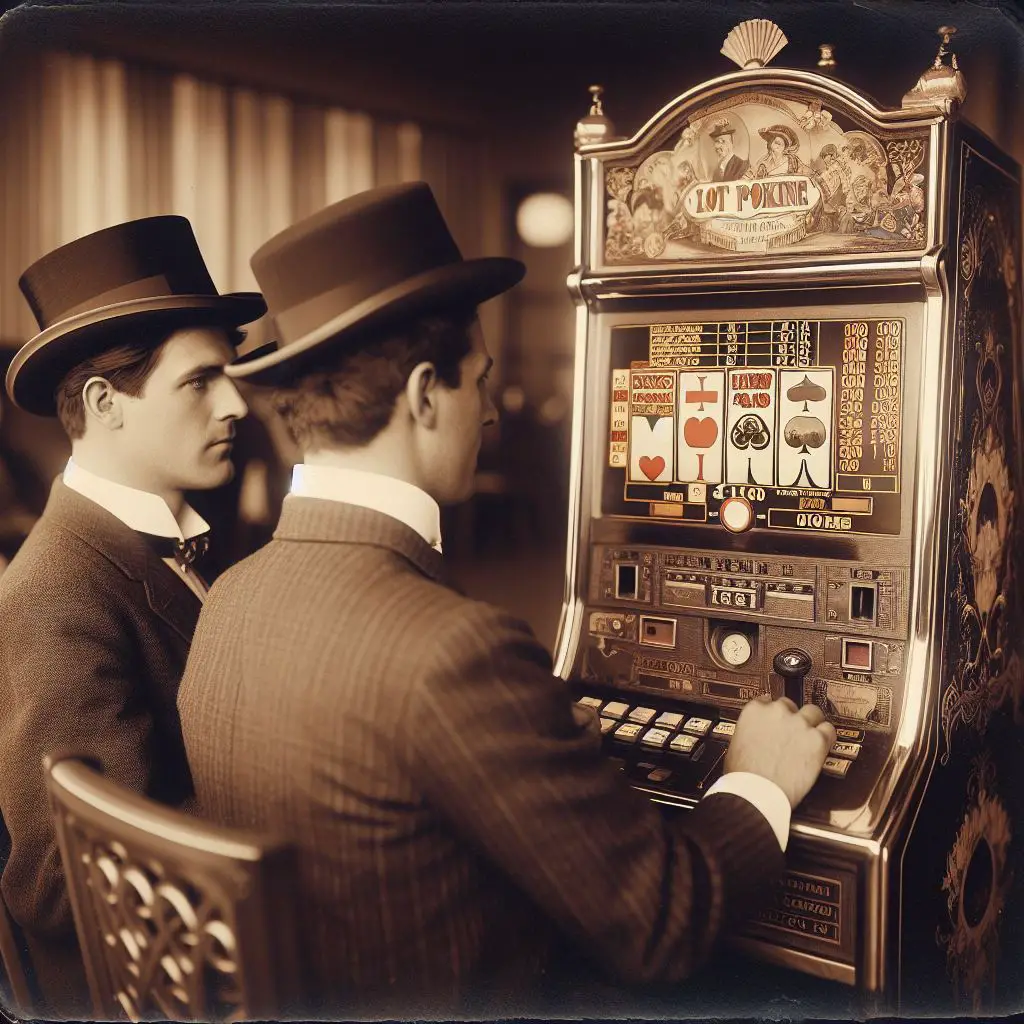For those who are seeking to master the game of video poker or optimize their gameplay, this video poker guide serves as an ideal resource. This is not merely a haphazard collection of tips and tricks but a comprehensive compilation of years of experience and meticulous research. It’s a treasure trove of knowledge from personal video poker experiences, insightful books, and engaging classes. Every wisdom and strategy gleaned over the years is ready to be shared with you. So, if you’re prepared for an enlightening journey into video poker, let’s dive in without further ado.
Table of Contents
The Evolution of Video Poker
Among the myriad of options available to savvy gamblers, Video Poker emerges as a favored choice for a variety of reasons. Its straightforward gameplay, comparable to that of a slot machine, makes it accessible and easy to play. Nevertheless, unlike slot machines, video poker provides players with an element of control; they can decide which cards to keep and how many, influencing the outcome of the hand. As a solitary game, it offers a unique advantage – there’s no need to interact with other players. Furthermore, among all online casino games, video poker holds the distinction of having the lowest house edge. This, along with other key information that determines the casino’s advantage, is readily available on the game’s interface. Despite its current widespread popularity, video poker wasn’t always so well-received. Since its introduction, the game has evolved significantly. Let’s explore this captivating journey of transformation.
Poker Machines – The Forerunners of Modern Video Poker Games

Understanding the progression of video poker necessitates a journey back to its roots.
The story begins in 1891 when the Sittman and Pitt Company crafted a poker machine in Brooklyn, New York. This machine, equipped with five ‘drums’, each bearing images of 10 playing cards, was the rudimentary equivalent of today’s machines. Upon inserting a coin and yanking the handle, the drums spin and eventually pause on a card image, forming a final poker hand.
Fast forwarding to 1898, Charles Fey, now known as the father of the slot machine, designed the “Card Bell”. This poker machine rewarded up to 20 coins for a royal flush.
In 1901, Fey introduced another innovation – the “Skill Draw” poker machine. This machine had a hold feature that allowed players to retain selected cards and re-spin to better their hands, marking the birth of the first five-card draw poker machine.
The early 1900s saw Sittman and Pitt also producing draw poker machines. Poker was the darling card game of the time, and the inclusion of the draw feature provided players with a semblance of control, contrasting starkly with the wholly luck-dependent slot machines. The demand for these machines was phenomenal, to the point that the two companies struggled to keep pace. These machines could be found in virtually every liquor store and tobacco shop across America.
However, since gambling was not yet legal in most parts of the country, winnings were rewarded in the form of drinks, cigars, or cigarettes.
Players presumed these games used a full deck of 52 cards. However, each drum contained only 10 cards, meaning only 50 were in play. Typically, the ten of spades and the jack of hearts were excluded, which effectively halved the odds of landing a royal flush, as it was impossible to get one in either spades or hearts!
The Initial Stages of Video Poker Machines
The inception of video poker machines dates back to 1970 when Dale Electronics introduced the “Poker-Matic.” This groundbreaking machine found its place in almost all casinos in Las Vegas during that era. Despite not creating a significant stir, Poker-Matic paved the way for future games that would captivate gamblers and generate considerable income.
In the mid-1970s, Si Redd, a distributor for Bally’s Gaming, presented the idea of “Video Poker” to his company’s executives in Chicago. However, the proposal was quickly dismissed as the leadership was reluctant to move away from their primary focus – slot machines. This decision was later recognized as one of the company’s significant missteps.
Nevertheless, the executives allowed Si to secure the patent rights. Shortly after, Si joined forces with Fortune Coin Company in Reno and established Si Redd’s Coin Machines, also known as SIRCOMA. He initiated the mass production of his video poker games, and while the initial interest was lukewarm, by 1981, video poker had become a highly desirable addition to casinos.
The initial versions of the game necessitated at least two pairs to form a winning hand, which didn’t excite players much. Yet, the game’s popularity surged when the lowest winning hand was changed to a pair of jacks or better.
The early models of the game were rather basic, mirroring the televisions of that time. Eventually, Si took the company public and rebranded it as International Gaming Technology (IGT), which subsequently rose to prominence in the casino gaming equipment industry.
The Mechanics Behind Video Poker
Enhancing your video poker gaming experience involves more than just playing the game; it requires a basic understanding of how a video poker machine operates. It’s important to clarify that you can still be proficient in video poker without delving into the technicalities of the game. This concept is akin to using an electrical appliance or turning on a light switch – you don’t necessarily need to understand the intricacies of electricity to use it effectively. However, having some insight into the mechanics of the game can prove advantageous, especially when faced with unexpected situations during gameplay.
The Random Number Generator – The Core Essence of Video Poker
A random number generator is a device, either mechanical or digital, designed to produce a sequence of symbols or numbers that cannot be predicted with more than random certainty. This technology plays a vital role in contemporary gaming machines like slot machines and video poker games. These games use a random number generator that leverages complex computational algorithms to generate extended sequences of outcomes that appear random. These outcomes, often referred to as pseudo-random numbers, may seem entirely random but are generated by these predetermined algorithms. The sophistication of these algorithms is such that they meet the stringent requirements for randomness set by gaming control authorities, thereby ensuring fair play in casino games.
Inner Mechanics Of Early Video Poker Machines
In the early stages, video poker machines were designed with a simple system that made use of a random number generator to shuffle and deal all necessary cards for a game. This generator would cycle rapidly through thousands of numbers each second until the player pressed the Deal button. At this point, the next 10 numbers from the generator would determine the 10 cards to be dealt: five for the initial hand and another five to replace any discarded cards. If a card was discarded, the card “behind” it was played. The generator continued its cycling process but had no further role in that hand.
This system served its purpose effectively for quite some time until certain astute and innovative players started detecting patterns in the dealt cards. Despite the random number generator passing all randomness tests by the gaming commission, there was indeed a noticeable pattern. These players discerned that when a specific sequence of five cards was shown, the replacement cards mirrored those of earlier hands with the original five cards.
Following meticulous observation and documentation, they managed to record sufficient patterns to gain an advantage over the house. Empowered with this new information, they embarked on a tour of Las Vegas casinos, playing longer sessions on quarter machines and then dollar machines, amassing significant winnings.
However, their greed did not go unnoticed. Casino management started observing unusually high payouts from some video poker machines at particular times. This led to the implementation of a surveillance program. Before long, the pair was caught. The casinos attempted various strategies to prove cheating but eventually dropped charges in exchange for information about their method.
Armed with this knowledge, the casinos reached out to the video poker game manufacturer to share their discoveries.
The Inner Mechanics Of Video Poker Machines Are Improved
Almost immediately after the discovery of the pattern exploitation, changes were put into place to forestall a recurrence of the same pricey circumstance. This is how the modifications were executed:
The random number generator persists in its cycling process until the player presses the Deal button. Subsequently, the next five numbers produced by this generator are employed to form the five-card poker hand. The random number generator doesn’t cease its cycling until the player chooses the cards they wish to keep and hits the Draw button. At this juncture, the machine utilizes the following numbers from the random number generator to decide on the replacement cards for those discarded.
By modifying this procedure, it has essentially become a herculean task to spot any discernible patterns. This is because there are too few cards chosen at every stage, and there can be a significant time gap between each request for cards.
The Internal Mechanisms Of Video Poker Machines Are Extremely Intricate
The complexity of the earliest mechanical poker machines was quite astonishing. The creation of the first 50-card mechanical poker machines was a considerable achievement, particularly since the necessary technology was already integrated into the slot machines of that era. However, it required a high degree of mechanical expertise to introduce the option of replacing some or all of the cards displayed after the initial spin.
Even with their intricate nature, these machines don’t hold a candle to the sophistication of modern video poker machines. At first glance, today’s video poker games may seem straightforward, closely mirroring the structure of a slot machine. However, the software programming that drives them is incredibly complex, comprising thousands of lines of code. While programming the basic Jacks or Better game might be relatively simple, the majority of current video poker games offer a choice from dozens of games to play. Each of these games could have unique features not found in others on the same machine. When a game is chosen, it needs to show the state of that specific game as it was last played. Some games might feature progressive aspects, while others may include a double-up feature that enables the player to wager a winning hand for a double or nothing. Add the ability to choose the denomination of the game you intend to play, such as nickel, quarter, half a dollar, a dollar or more, and the level of complexity increases exponentially.
Reasons to Play Video Poker

Video poker stands out as a choice to consider among the numerous games you can engage in at a casino. The uniqueness of this game is that it requires not just luck but also skill and strategy to excel. The mastery of video poker doesn’t come overnight; it demands time and effort to learn and perfect the specific strategy for the version(s) you wish to play. This might seem daunting, but the payoff is well worth it. Whether it’s the thrill of strategizing, the potential for significant wins, or just the love for card games, plenty of compelling reasons make video poker an engaging and rewarding option. So, let’s delve into video poker and discover what makes it a game worth playing.
Lower House Edge
In today’s casino environment, slot machines are known to have a house edge that generally ranges from six to 20 percent. This implies that for every 100 dollars bet on these machines, the casino will pocket between six and 20 dollars. The losses aren’t distributed uniformly, but over time and depending on the machine, you can expect to lose six to 20 dollars for every 100 dollars you wager.
In stark contrast, video poker games offer a significantly reduced house edge. There was a time, about 20 to 30 years ago when video poker games were so player-centric that proficient players could make a profit. Sadly, those golden days are no longer with us. Nevertheless, it’s still feasible, albeit rare, to find games that provide a return exceeding 100 percent over time. Most video poker machines have a house edge that varies from just a quarter of a percent to around five percent. This means that instead of losing six to 20 dollars per 100-dollar bet, your losses would be confined to just 25 cents to five dollars per 100 dollars wagered – a significant departure. Given these odds, your chances of finishing a game session in the black are substantially higher. Even under the worst circumstances, your bankroll will stretch further, allowing you to extend your casino experience and improve your odds of hitting a jackpot.
This primary benefit is why video poker has become the preferred game among astute casino players.
Control Over Outcome
Video poker differentiates itself from other casino slot games by granting players a measure of control over the outcome. You’re given five cards when you wager and press the Deal button. The destiny of these five cards is entirely in your hands. You are free to keep all, discard all, or selectively retain the cards that align with your strategy. The decision is solely yours. If you neglect lower-paying hands and target a royal flush, you may opt to maintain only those cards that amplify your chances of achieving a royal flush. Though this might not be the optimal strategy overall, it’s your prerogative.
In the same vein as blackjack, video poker is a strategic game that lures many proficient players. Just as it’s wise to abide by a basic strategy designed for the specific rules of the blackjack game you’re engaged in; the same rationale applies to video poker. To maximize your returns from video poker, following a strategy specifically formulated for the particular video poker game you’re playing is recommended. Furthermore, akin to buying basic strategy cards for blackjack, you can also secure video poker strategy cards for some of the most popular games. Consider employing a computer program or app for an exhaustive playing strategy for almost any video poker game. A host of these can be discovered by searching online for “video poker strategy app” or “video poker app.”
The rare opportunity to adjust your outcomes mid-hand is a feature not provided by conventional slot machines, positioning it as one of the primary reasons for selecting video poker as your game of choice.
No Pressure During Gameplay
Encountering individuals with exceptional skills in casino games such as blackjack or craps is not a rare occurrence. You might have personally observed instances where the casino personnel requested a player to vacate their spot at the table, reflecting their unease with skilled players. Casinos harbor a strong dislike for card counters and dice “controllers” at the craps tables. They are not disliked because they cheat, but due to their ability to tilt the odds in their favor through their expertise. If these players don’t effectively mask their talents, or if they play too long or show excessive greed, they may be ordered to cease their game or even risk being ejected from the casino, with a warning of arrest if they return.
On the other hand, when playing video poker, such risks are absent. Even though your expertise can result in significant returns, casinos are aware that their video poker machines will remain a source of income for them. They will not meddle in your game, letting you play uninterrupted for hours, days, or even years. This lack of interference is among the reasons why many proficient players are drawn to video poker.
Engage in the game at your preferred speed
In the realm of casino games, the speed of games such as blackjack, roulette, craps, and most live table games is determined by the dealer, leaving players with minimal control over the game’s pace. This dynamic changes drastically with video poker games and slot machines lacking a dealer. In these games, you, as the player, have total command over the speed of your play. It doesn’t matter if you prefer a laid-back, slow style or want to cycle through hundreds of hands each hour rapidly; the decision is entirely yours. You can choose when to dial back, accelerate, or take a pause. This degree of control and independence over the game’s speed is a major reason machine-based games are so attractive to millions of people. They offer a gaming experience free of hassles, enabling players to relish the game at their preferred pace.
Final Thoughts About Our Video Poker Guide
Our journey through the world of video poker guide concludes here. Remember, success in video poker combines skill, strategy, and a bit of luck. Keep practicing and refining your approach to the game. We hope this guide elevates your video poker experience. Until next time, may the odds be ever in your favor at the casino.
Related Gaming Reading on TwoVerbs

Michigan Sports Betting: 5 Key Insights for Winning Big
Incendio Wand in Pop Culture: Its 4-Point Influence Beyond Harry Potter
Balancing Risk and Reward: A Guide to Safe DOTA 2 Betting
Mobile Slot Gaming Guide: 5 Proven Strategies for Winning Big



